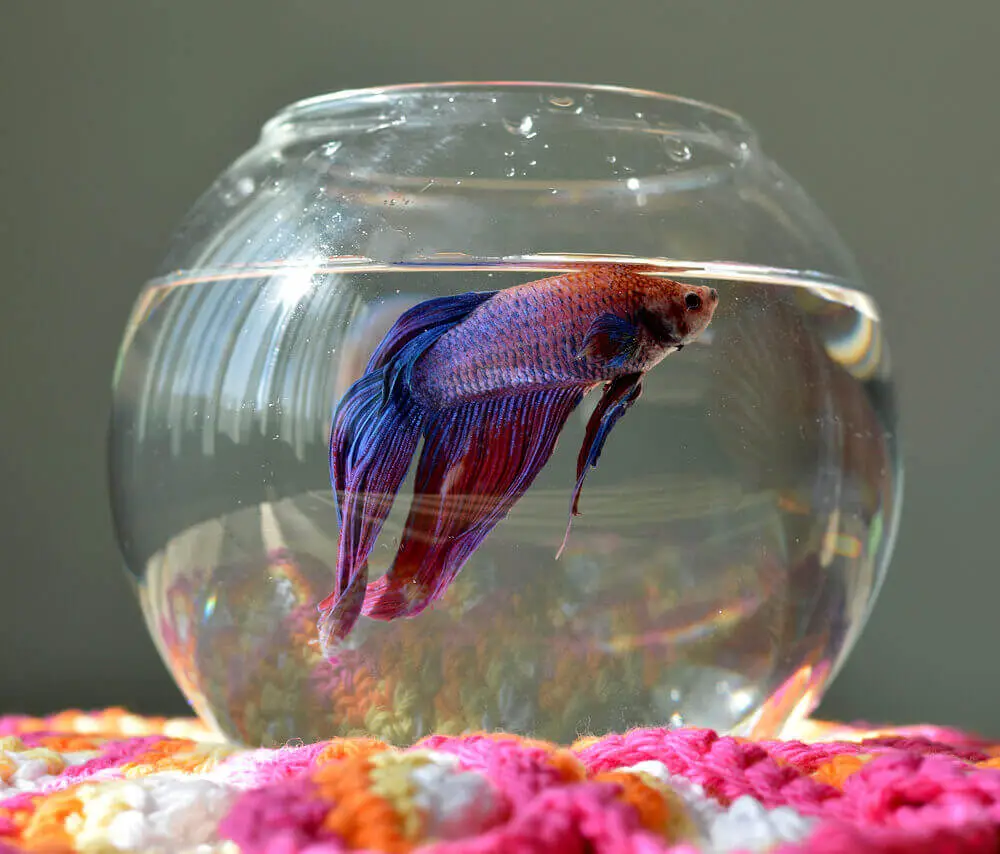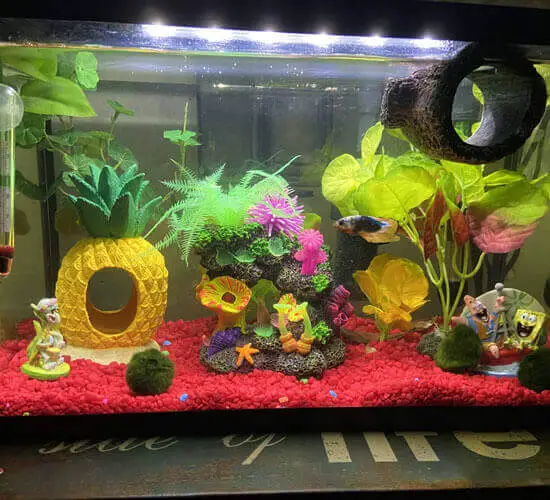Originally posted on May 22, 2023 @ 6:00 pm
Last Updated on 42 mins by admin
Are you looking to rescue and care for a Betta fish? These vibrant and colorful fish are a popular choice for many aquarium enthusiasts, but they require specific care and attention to thrive.
In this guide, we will cover everything you need to know about rescuing and caring for a Betta fish, from setting up their tank to maintaining their health and happiness. Whether you are a beginner or an experienced fish owner, you will find valuable tips and insights to help you provide the best possible care for your Betta fish. So let’s dive in and learn how to give your Betta the love and care they deserve!
If you want to rescue and care for a betta fish, here are some tips to follow:
- Find a proper tank for your betta fish with a filter and heater.
- Condition the water before adding the fish.
- Feed the fish a balanced diet of pellets and live or frozen foods.
- Keep the tank clean with regular water changes and tank maintenance.
- Look out for signs of illness and treat promptly if necessary.

Rescue and Care for a Betta Fish: A Complete Guide
If you’re looking for a pet that’s colorful, easy to care for, and fun to watch, look no further than the Betta fish. However, these beautiful creatures require specific care to ensure they thrive in their environment. In this article, we’ll explore how to rescue and care for a Betta fish, from their initial rescue to their habitat and feeding needs.
1. Rescuing a Betta Fish
If you’re rescuing a Betta fish, it’s important to know that they can be stressed and in poor health. To ensure a successful rescue, follow these steps:
First, choose a healthy Betta fish. Look for fish that are swimming actively, have bright colors, and are eating well.
Next, transport the fish in a plastic bag filled with its original water and some oxygen. This will reduce stress during transport.
Once you’ve brought the fish home, quarantine it in a separate container for a few weeks. This will help you monitor its health and ensure it doesn’t spread any diseases to your other fish.
2. Setting up the Habitat
Betta fish are tropical fish, so they require a warm environment. To set up their habitat, you’ll need:
A tank of at least 5 gallons. This will give your Betta fish enough space to swim and explore.
A heater to maintain a temperature of 75-80°F.
A filter to keep the water clean.
A substrate such as gravel or sand.
Plants and decorations to provide hiding spots and stimulation.
3. Water Quality
Maintaining high water quality is essential for the health of your Betta fish. Here are some tips:
Change 25% of the water every week.
Test the water regularly for pH, ammonia, and nitrate levels. Keep these levels within the recommended range.
Use a water conditioner to remove chlorine and chloramine from tap water.
4. Feeding
Betta fish are carnivorous, so they need a protein-rich diet. Here are some feeding tips:
Feed your Betta fish small amounts of high-quality food once or twice a day.
Offer a variety of foods such as pellets, frozen or live brine shrimp, and bloodworms.
Avoid overfeeding, as this can lead to obesity and health problems.
5. Behavior and Socialization
Betta fish are known for their aggressive behavior, so it’s important to keep them in a tank by themselves. Here are some tips:
Provide hiding spots and plants to create a sense of security.
Avoid putting a mirror in the tank, as this can cause stress and aggression.
Observe your Betta fish’s behavior and adjust its environment accordingly.
6. Common Health Issues
Like all pets, Betta fish can experience health issues. Here are some common problems to watch out for:
Fin rot, which is characterized by frayed fins and tail.
Ich, a parasitic disease that causes white spots on the fish.
Swim bladder disorder, which causes the fish to float or sink.
7. Benefits of Owning a Betta Fish
Owning a Betta fish can be a rewarding experience. Here are some benefits:
They are low maintenance pets that don’t require a lot of attention.
Watching Betta fish swim can be relaxing and stress-relieving.
They are beautiful and come in a variety of colors and patterns.
8. Betta Fish vs. Other Fish
Betta fish have some unique characteristics that make them stand out from other fish. Here are some differences:
Betta fish are labyrinth fish, which means they can breathe air from the surface.
They are territorial and should be kept in their own tank.
Betta fish have a unique personality and can recognize their owners.
9. Conclusion
In conclusion, Betta fish are beautiful and fascinating pets that require specific care to thrive. By following the tips outlined in this guide, you can provide your Betta fish with a happy and healthy home. Remember to rescue responsibly, set up a suitable habitat, maintain water quality, provide a healthy diet, and observe your fish’s behavior for signs of health issues.
10. Additional Resources
Here are some additional resources for Betta fish owners:
Betta Fish Center: https://bettafishcenter.com/
The Spruce Pets: https://www.thesprucepets.com/betta-fish-4162554
Fishkeeping World: https://www.fishkeepingworld.com/betta-fish/
Frequently Asked Questions
In this section, you will find answers to some of the most commonly asked questions about rescuing and caring for a Betta fish. Whether you are a first-time Betta owner or an experienced fish enthusiast, these tips will help you provide the best possible care for your pet.
1. How do I rescue a Betta fish that is in distress?
If you come across a Betta fish that is in distress, the first thing you should do is remove it from its current environment and place it in a clean, well-oxygenated tank. Make sure the water is at the right temperature and pH level for Betta fish, and add some aquarium salt to help reduce stress. You can also add some plants or decorations to provide shelter and hiding places for the fish.
Once you have rescued the fish, monitor it closely for signs of recovery. If it does not improve within a few days, consult a veterinarian or a fish expert for further advice.
2. How often should I feed my Betta fish?
Betta fish should be fed once or twice a day, with a diet consisting of high-quality fish food. You can also supplement their diet with live or frozen foods such as brine shrimp or bloodworms. However, be careful not to overfeed your Betta fish, as this can lead to health problems such as bloating and constipation.
It is also important to remove any uneaten food from the tank to prevent contamination of the water. A good rule of thumb is to feed your Betta fish only as much as it can consume in two minutes.
3. How do I maintain the water quality in my Betta fish tank?
Keeping the water in your Betta fish tank clean and healthy is essential for the well-being of your pet. You should perform water changes regularly, ideally once a week, to remove any debris or waste products that may be accumulating in the tank. You should also test the water regularly for pH, ammonia, and nitrate levels, and adjust them if necessary.
Make sure your Betta fish tank has a good filtration system and adequate aeration to maintain optimal water quality. You can also add some aquarium plants to help absorb excess nutrients and prevent algae growth.
4. How can I tell if my Betta fish is sick?
There are several signs that may indicate that your Betta fish is sick or in distress. These include lethargy, loss of appetite, unusual swimming patterns, discoloration, and fin rot. If you notice any of these symptoms, it is important to take action immediately to prevent the condition from worsening.
You should quarantine your Betta fish in a separate tank and seek advice from a veterinarian or a fish expert. They may recommend medication or other treatments to help restore your pet’s health.
5. How do I choose the right tank for my Betta fish?
When choosing a tank for your Betta fish, there are several factors to consider. The tank should be large enough to provide adequate swimming space for your pet, but not too large as to make it difficult for the fish to find food or shelter.
You should also consider the material of the tank, as some materials may be more prone to cracking or leaking. Glass or acrylic tanks are good options, as they are durable and easy to clean. Finally, make sure the tank has a good filtration system and adequate aeration to maintain optimal water quality.

5 Things I Wish I Knew BEFORE I Got My First Betta Fish
In conclusion, rescuing and caring for a betta fish can be a rewarding experience. By following the proper steps, you can provide a loving environment for your fish to thrive in. Remember to research and understand the needs of your betta fish, including proper water temperature, food, and tank size.
Additionally, it is important to monitor your betta fish for any signs of illness or distress. Regular water changes and tank cleanings can help prevent health issues. With patience and consistency, you can create a beautiful and healthy home for your betta fish.
Overall, rescuing and caring for a betta fish takes dedication and effort, but the result is a happy and thriving pet. As you continue to learn and grow in your role as a betta fish owner, you will develop a deeper appreciation for these fascinating creatures and the joy they bring to your life.
